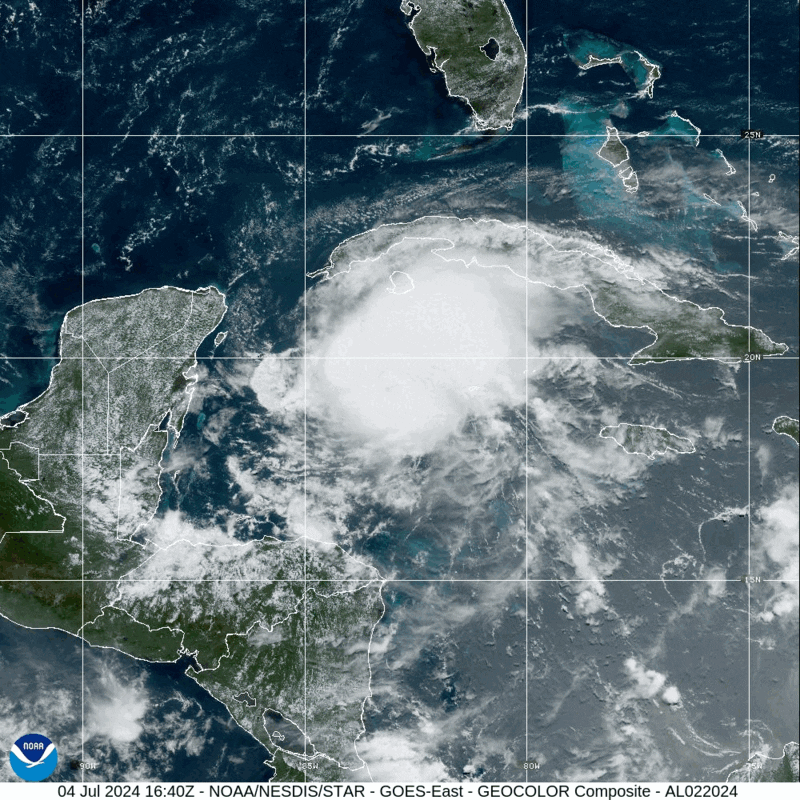Cancún, Mexico – Tourist resorts in Mexico’s Yucatan Peninsula girded Thursday for a hit from Hurricane Beryl, which is still packing ferocious winds after slamming Jamaica and the Cayman Islands.
Beryl dropped to a Category 2 storm, with winds of 175 kilometers (110 miles) per hour, and was expected to weaken further as it headed toward landfall overnight Thursday into Friday on the peninsula, the US National Hurricane Center (NHC) said.
As of mid-afternoon Thursday it was in the Caribbean about 345 kilometers (215 miles) southeast of Tulum. The resort city is about a two-hour drive from the other major tourist destination in the region, Cancun.
The storm has already left a trail of destruction across the Caribbean and the coast of Venezuela, killing at least seven people.

It is the first hurricane since NHC records began to reach the Category 4 level in June and the earliest to reach the highest Category 5 in July.
In Mexico, schools in the area bracing for a hit were suspended and shelters were set up for locals and tourists.
In Cancun, people have been stocking up on food and other essentials for days and hotels have boarded up their windows.
Some 100 domestic and international flights scheduled between Thursday and Friday have been canceled at Cancun airport, the main hub in the Mexican Caribbean.
Beryl is expected to hit the Yucatan Peninsula, emerge over the Gulf of Mexico, then arrive in the northern state of Tamaulipas, which borders the United States.
Hundreds of tourists were evacuated from hotels along Mexico’s coastline while some were still attempting to take buses out of the impact zone.
However, some were still enjoying a sunny day at the beach before taking shelter in their hotels.
“They cancelled our flight and we had to pay for two extra nights,” said Virginia Rebollar, a Mexican tourist who traveled with three family members to Tulum.
“We have some fear but we are convinced that people are prepared and know what to do,” Rebollar said.
Hurricane Beryl: Record-breaking storm
The Mexican army has deployed some 8,000 troops in Tulum and announced that it has food supplies and 34,000 liters of purified water to distribute to the population.
The hurricane has already caused flash floods and mudslides in the Cayman Islands.
In Jamaica, more than 400,000 people were without power, according to the Jamaica Gleaner newspaper, citing a public service company.
Britain’s King Charles said he had been “profoundly saddened” by the destruction from the hurricane in the Caribbean, which impacted several islands in the Commonwealth.
It is extremely rare for such a powerful storm to form this early in the Atlantic hurricane season, which runs from early June to late November.
Warm ocean temperatures are key for hurricanes, and North Atlantic waters are currently between two and five degrees Fahrenheit (1-3 degrees Celsius) warmer than normal, according to the US National Oceanic and Atmospheric Administration (NOAA).
UN climate chief Simon Stiell, who has family on the island of Carriacou, said climate change was “pushing disasters to record-breaking new levels of destruction.”
“Disasters on a scale that used to be the stuff of science fiction are becoming meteorological facts, and the climate crisis is the chief culprit,” he said Monday, reporting that his parents’ property was damaged.
bur-dw/des/bjt
© Agence France-Presse
Article Source:
Press Release/Material by Ivan SHAW | AFP
Featured image credit: NOAA



